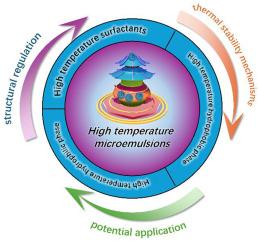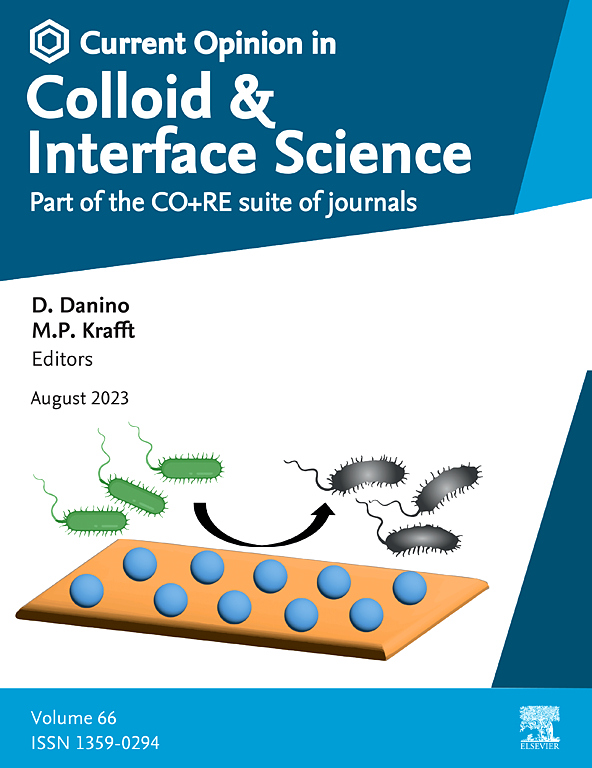Advances in high-temperature microemulsions
IF 7
2区 化学
Q1 CHEMISTRY, PHYSICAL
Current Opinion in Colloid & Interface Science
Pub Date : 2025-08-18
DOI:10.1016/j.cocis.2025.101954
引用次数: 0
Abstract
Designing microemulsions for high-temperature stability remains a critical challenge in colloid science. This review highlights the effects of temperature on interfacial curvature and phase behavior, and proposes two strategies for the design of high-temperature microemulsions: (1) Advanced formulations using high-boiling-point solvents and thermally robust surfactants; (2) Ionic liquids (ILs) as multifunctional components, which enable microemulsions with unprecedented thermal stability. Notably, all-IL systems achieve stability up to 200 °C under ambient pressure while maintaining their nanoscale structure, as evidenced by in situ SAXS and cryo-TEM analysis. Applications in enhanced oil recovery, nanomaterial synthesis, and high-temperature nanoreactors are highlighted. Finally, future research directions are proposed, including the advanced structural characterization techniques, the development of green surfactant, the design of new-generation ILs, and the exploration of emerging research fields. This work provides a comprehensive roadmap for extending microemulsion functionality to extreme thermal environments.

高温微乳液的研究进展
设计具有高温稳定性的微乳液仍然是胶体科学的一个关键挑战。本文综述了温度对界面曲率和相行为的影响,并提出了高温微乳的两种设计策略:(1)采用高沸点溶剂和热强表面活性剂的先进配方;(2)离子液体(ILs)作为多功能组分,使微乳液具有前所未有的热稳定性。值得注意的是,原位SAXS和低温透射电镜分析证明,全il系统在环境压力下可达到200°C的稳定性,同时保持其纳米级结构。重点介绍了其在提高采收率、纳米材料合成和高温纳米反应器等方面的应用。最后,提出了未来的研究方向,包括先进的结构表征技术、绿色表面活性剂的开发、新一代表面活性剂的设计以及新兴研究领域的探索。这项工作为将微乳液的功能扩展到极端热环境提供了一个全面的路线图。
本文章由计算机程序翻译,如有差异,请以英文原文为准。
求助全文
约1分钟内获得全文
求助全文
来源期刊
CiteScore
16.50
自引率
1.10%
发文量
74
审稿时长
11.3 weeks
期刊介绍:
Current Opinion in Colloid and Interface Science (COCIS) is an international journal that focuses on the molecular and nanoscopic aspects of colloidal systems and interfaces in various scientific and technological fields. These include materials science, biologically-relevant systems, energy and environmental technologies, and industrial applications.
Unlike primary journals, COCIS primarily serves as a guide for researchers, helping them navigate through the vast landscape of recently published literature. It critically analyzes the state of the art, identifies bottlenecks and unsolved issues, and proposes future developments.
Moreover, COCIS emphasizes certain areas and papers that are considered particularly interesting and significant by the Editors and Section Editors. Its goal is to provide valuable insights and updates to the research community in these specialized areas.

 求助内容:
求助内容: 应助结果提醒方式:
应助结果提醒方式:


